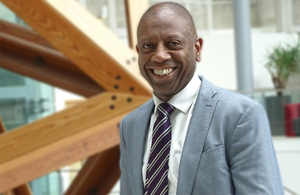“Be patient, be cool”
Keith Fraser, Chair of the Youth Justice Board, reflects on what young leaders have taught him.

Keith Fraser
Over recent months I’ve had the great fortune to speak alongside young leaders at various events. These young leaders have, sometimes against the odds, got out or stayed out of the criminal justice system, and they have much to teach us. I asked them what advice they would offer to adults working with children in and around the youth justice system and their answers are familiar yet thought provoking.
The right approach
Evidence shows that positive, supportive relationships with trusted adults are key to desistance, so how do we go about creating that? Young leaders highlighted three crucial elements:
Patience
“You first must build trust and rapport in order to achieve a positive response.”
Be yourself
Adults can be “too formal” so instead to just “be cool”, “be authentic”, “find common ground”
Consistency
Become a “familiar face” and make sure you are consistently available to create a feeling of safety and trust. One young leader saw the presence of services as crucial, she said: “I always had a safe place to go, whatever was happening.”
Offer an alternative
The key to preventing offending in the long term is not about just focusing on stopping a child from doing a certain behaviour. For example, to prevent a child from carrying a knife, we can’t expect a knife awareness course to do to trick by itself. We also need to address the needs of the child. Research shows that children carry knives through coercive control and/or in response to feelings of fear and the need to protect themselves. This is constructed by children as harm prevention and being streetwise, therefore we need to make them feel safe. Are they at risk of being criminally exploited by a gang? Then we need to provide them with alternative role models, career prospects and skills to build a path away from crime.
Sport and physical activity have been a big part of how many of the young leaders I’ve been speaking to recently have built a positive path for themselves. For many of them this alternative space to direct their energy and frustration has also been a source of role models, new skills, confidence and purpose.
Succinctly put, one young leader said: “Instead of getting into trouble I started training in mixed martial arts, so I had something to do with my time.” He went on further to say: “That’s where I met my coach, he is my role model, we just gelled and now it’s a way of life. Our wrestling club is my family, I fit in straight away and now I’m looking to compete.”
Relatable role models
Young leaders were also keen advocates for relatable role models.
One young leader said: “It’s easier for me to speak and relate to someone who’s grown up in the same environment as me. If they’ve been there, then it helps them make sense. They’ve probably made the same mistakes, so they understand what you’ve been through and can provide the right solutions.”
At the YJB we’re proud to be a part of the Going Forward Into Employment Scheme which recruits people with experience of the criminal justice system. There is absolutely more that we and others can do to make sure we’re recruiting from the widest possible pool of talent, and that diversity of thought is not only accepted, but cherished. I’d encourage others to do the same and reap the rewards.
I am so grateful to the young leaders who have spoken alongside me this year. I am well past being shocked by the brilliance and potential of children, but hearing from them first hand remains inspiring. The sense of hope they generate through their ideas, enthusiasm and talent is infectious, and I encourage you all to embed their voices throughout your work.